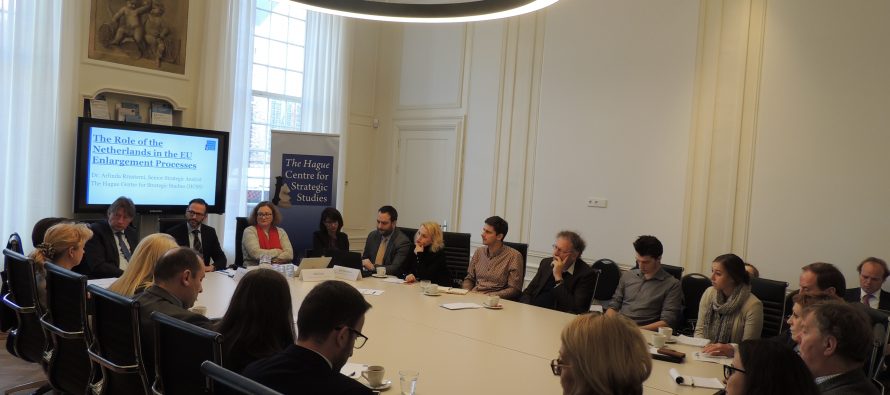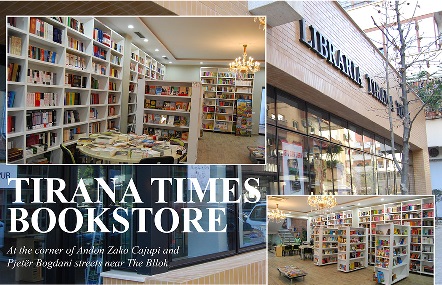AIIS, EMinS and HCSS discuss Albania Serbia relations at the Hague

Story Highlights
- The Joint Centre for Albania Serbia Relations is marking its fourth year of successful activities in bringing together students, reporters, experts and decision makers from both countries, enhancing bilateral dialogue and cooperation and challenging misconceptions and prejudice.
Related Articles
An experts forum “Albania-Serbia relations: the way forward for regional stability and integration” was held on Tuesday at the Hague Centre for Strategic Studies in the context of the project Centre for Albania-Serbia Relations 2019 Activities, funded by the Kingdom of the Netherlands.
The event was opened by the HCSS Founder Rob De Wijk, who focused on geopolitical developments and the future of the region.
He mentioned that enlargement had been a success story of the past and to revive the positive discussion nowadays we need to go back to the fundamentals of the peace project.
Alba Cela and Jelica Minic from the project-implementing organizations mentioned the achievements of the Center in bringing together young people, economy experts and media and therefore changing long-held misconceptions and prejudices.
Cela emphasized that bringing the positive message of the bilateral cooperation to EU member state audiences, an initiative integrated in the project by the Dutch Embassy in Tirana, was a positive step forward for the project.
Participating experts from Albania included Ilda Zhulali, advisor to the President, who urged both countries to go forward with simple concrete agreements that benefit citizens such as those in the field of education.
Igor Novakovic from civil society in Serbia also talked about the history of the relations at the official level and also the issues regarding minorities and their rights.
European integration was the keyword of the discussion as the main drive behind both domestic reforms and the improvement of bilateral relations.
All discussants agreed that the EU should have a clearer perspective for the region. Also the influence of other actors in the region was mentioned such as that of Russia and China as a further argument not to leave geopolitical vacuums.
Dutch discussants argued that the Netherlands' perspective as strict but fair would help the countries in the long run despite being challenging in the short term.
Experts from Albania and Serbia but also dicussants from Macedonia advocated together for positive developments related to the EU future such as visa liberalisation for Kosovo and the opening of negotiations from Albania and Macedonia , a decision expected in June of 2019.
The event was moderated by Michel Roelen, Strategic Analyst, The Hague Centre for Strategic Studies.
It was attended by experts, active diplomats ( Ambassador of Albania to the Netherlands and Deputy Ambassador of Serbia) , officials and students with an interest in the region and in EU integration as well.
the Joint Centre for Albania-Serbia Relations was launched in 2016 by the Forum for International Relations of the European Movement in Serbia (EMinS) and the Albanian Institute for International Studies (AIIS) with support of the Federal Republic of Germany.
The activities of the Centre in 2016 and 2017 were supported by the Embassy of the Federal Republic of Germany in Tirana, and the activities of the Centre in 2018, Embassy of the Kingdom of the Netherlands in Tirana.
The cooperation between Serbia and Albania has a strategic importance for the European integration of the Western Balkans.
The bilateral initiatives, which are of great importance for regional cooperation, have so far been in the shadow. Main obstacles to the establishment of normal and fruitful relations between Albania and Serbia include the lack of knowledge about each other and the lack of opportunity for contact and mutual cooperation.
Bearing all this in mind, the Albanian Institute for International Studies initiated the establishment of a joint centre that would encourage interaction between experts, journalists, researchers, artists and decision-makers of the two countries.
This project has offered a new approach for the improvement of Serbian-Albanian relations inspired by the civil society, and has provided new opportunities for mutual contact and cooperation, as well as for the improvement of the knowledge of citizens from these two countries about each other.
It has further helped young people to fight against mutual prejudice, open the space for cooperation between the media and engage decision makers at different levels to contribute to better cooperation between Serbia and Albania through active policies.




